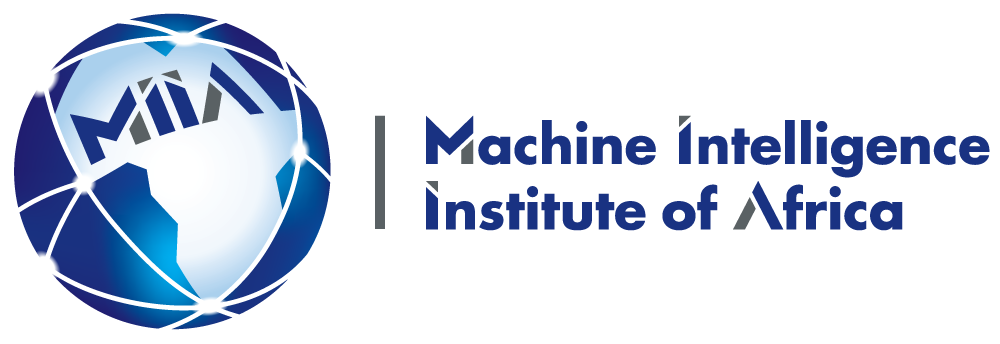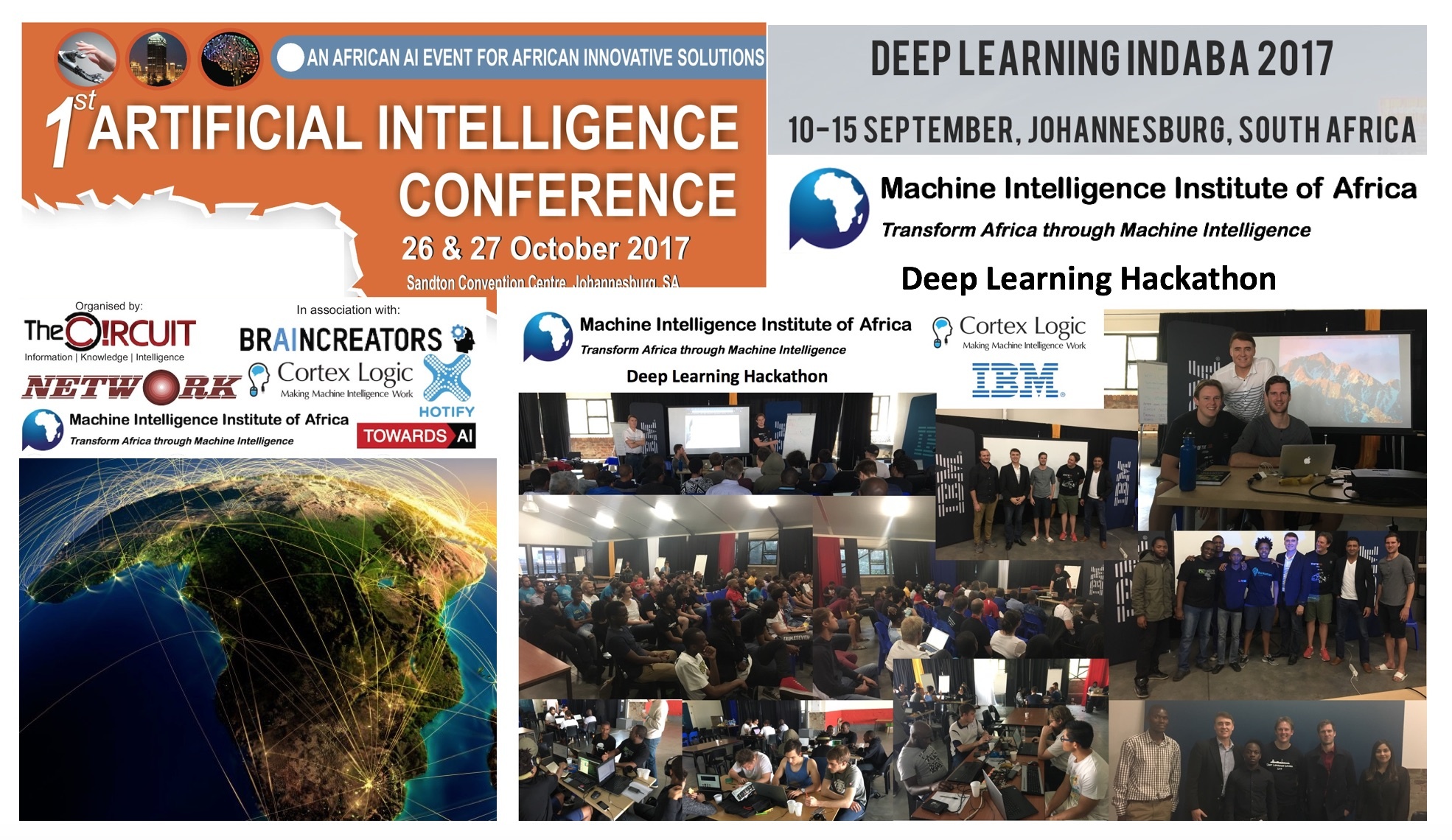
Deep Learning in Africa
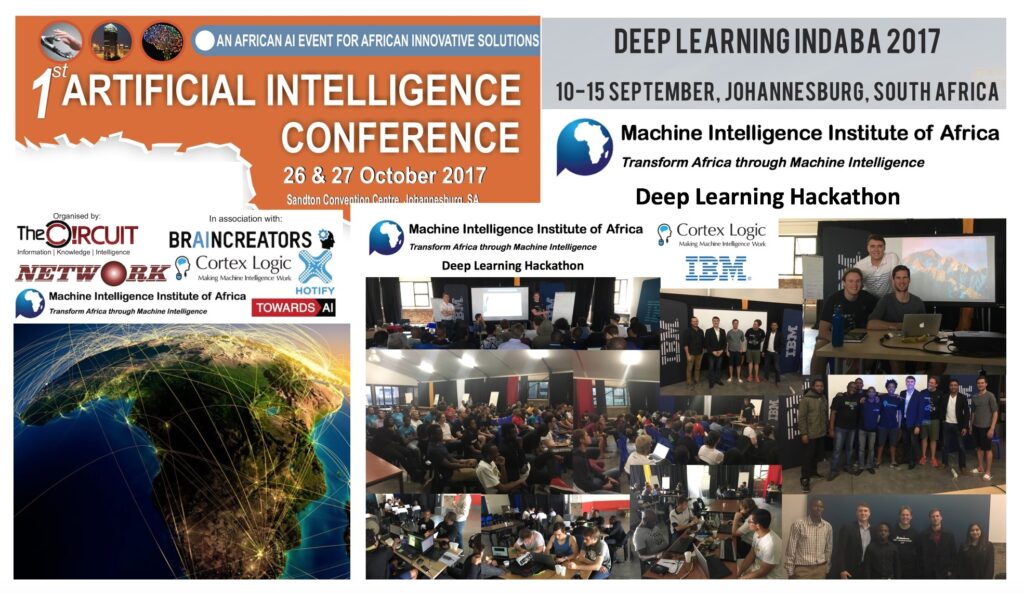
There is at present a major global focus on machine learning involving billions of dollars in investment and revenue; AI and by implication machine learning, is set to change the working of the world, including Africa. Deep Learning, as a subset of the machine learning toolbox and defined as artificial neural networks with many levels of abstraction, has been a driving force behind the renaissance of AI, helping us to build self-driving cars, accurate speech recognition, computers that can understand images, and much more (see also this Deep Learning post). The application of machine learning is also growing in leaps and bounds on the African continent and is being further strengthened by a range of exciting activities and initiatives such as the Deep Learning Indaba (sponsored by Google, amongst others), multiple Machine Intelligence Institute of Africa (MIIA) events (including a recent successful Deep Learning Hackathon), the 1st AI Africa Conference, Data Science Nigeria’s 1st National Summit on Big Data Economy and 2nd Data Science Bootcamp, MIIA’s representation at the Global Symposium of AI and Inclusion, and other Machine Learning events. What an eventful year for AI and Deep Learning in Africa so far with some more exciting events to follow! See more details below.
Although it is clear that we have just scratched the surface of Deep Learning’s application potential (especially dealing with unstructured data such as text, video, audio, and boosted by massive amounts of data and computational power), the same Deep Learning article also describes some of the limitations of Deep Learning and the need for a 3rd AI wave that involves contextual adaptation which focuses on constructing reliable, explanatory models of real-world phenomena using sparse data, like humans do. See also, for example, DARPA’s explainable AI project, the Keras blog’s The Future of Deep Learning (the use of “meta learners” and the blending of “algorithmic modules” providing formal reasoning, search, and abstraction capabilities, with “geometric modules” providing informal intuition and pattern recognition capabilities), Deep Learning is not the AI future (emphasizing some of the issues with Deep Learning including explainability), and Is AI Riding a One-Trick Pony. With all the talent and investment going into AI research and development, one can expect the AI toolbox to be tremendously enriched over the next few years and foreseeable future.
Although Africa’s contributions to AI research and development have been relatively limited thus far (we expect this to change soon with the fast growing collaboration across the continent and the many initiatives such as those highlighted in this post to strengthen the foundations of African machine learning), there have been many successful applications of AI technology in Africa: Apart from the many AI startups, platform businesses, non-profit organizations and corporates across the continent that are applying AI in innovative ways, there is also Africa’s contribution to Big Science, in particular in radio astronomy through the square kilometre array (SKA) telescope, that will advance the state of machine learning to provide new insights into the workings of the universe. Where health services and advice is limited, especially for HIV and AIDS, machine learning is used to shorten response times in mobile question-answering services, allowing these services to reach more people. Another example is in the area of support of food security of our African nations where computer vision is used to detect cassava root disease in images captured using low-cost mobile phones. We also have non-profit organizations such as the Machine Intelligence Institute of Africa (MIIA) which is an innovative community and accelerator for Machine Intelligence and Data Science research and applications to help transform Africa. On the AI business front, we also had some early successes such as my previous AI company, CSense Systems, which was South Africa’s first AI software and services company to be sold to a multinational company (it was acquired by General Electric in 2011). Some platform businesses such as Jumo and Zoona have also demonstrated successful Data Science applications to enable financial inclusion on the African continent. We are also very excited about AI startups such as Cortex Logic, aiming to be the leading AI engine provider for platform businesses and corporates on the African continent and beyond, and Bennit.AI, which provides an intelligent virtual production assistant to enhance the productivity and safety of industrial users.
Whereas we are clearly in a massive AI hype cycle with lots of debates about the future impact of AI (see also Will AI kill us all after taking our jobs? for a sober analysis), our focus is on shaping a better future in the smart technology era and using exponential technologies such AI to help transform Africa. As Homo Sapiens in the age of networks, we’ll need collective wisdom to build a better future for us all in the smart technology era. As Geoff Hinton said: “In a sensibly organized society, if you improve productivity there is room for everybody to benefit. The problem is not the technology, but the way the benefits are shared out”. As someone actively working on AI & its applications, I agree with the perspectives of my AI expert colleagues. With significant benefits and potential danger on the line for us all, a rational balanced approach is needed where we systematically first address short- to medium term concerns around AI’s impact on jobs, weapon systems, etc. and not get ahead of ourselves.
Now let’s get back to some of the exciting AI events on the African continent…..
Deep Learning Indaba
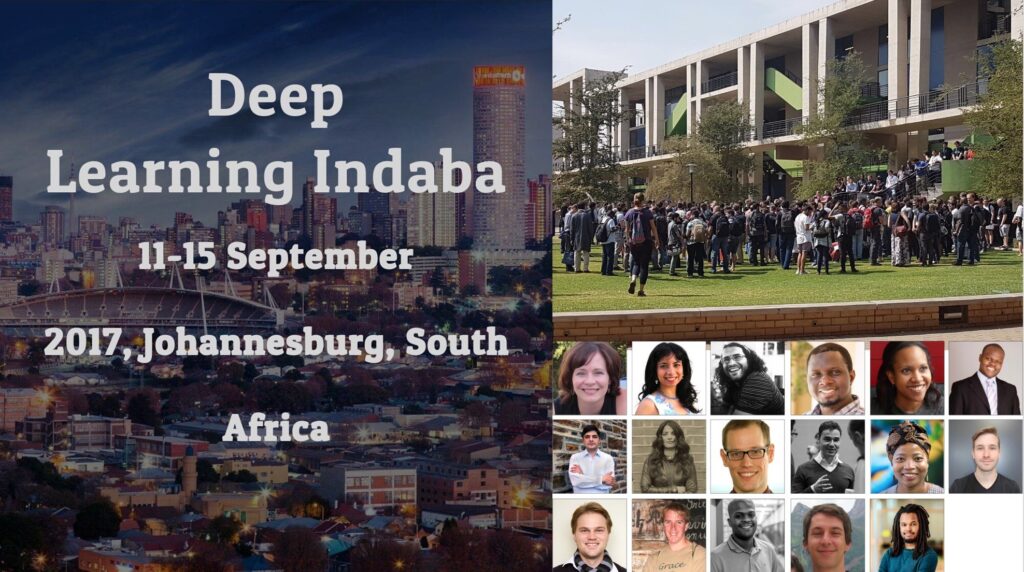
The first Deep Learning Indaba, a gathering of our African community to teach, learn and debate the state-of-the-art in machine learning and artificial intelligence, took place from 10 to 15 September 2017 at the University of the Witwatersrand, Johannesburg, South Africa. As the founder of the Machine Intelligence Institute of Africa (MIIA), it was very exciting to participate, amongst many other MIIA members, in this awesome event! The aim during the week was to build an understanding of the principles and practice of modern machine learning, in particular covering topics such as the fundamentals of Machine Learning, Convolutions and Recurrent Neural Networks, Unsupervised Learning and Generative Models, and Reinforcement Learning, Agents and Applications. Of equal importance was the creation of an environment that enables continental collaborations, a raised awareness of the breadth of machine learning career-paths, and that fosters new understandings and friendships.
I’m very proud of the Africans on the organizing and advisory committee that helped to make this happen! They included South African representatives from Google DeepMind (in particular, Shakir Mohamed and Ulrich Paquet) as well as Google Brain (Stephan Gouws) that have formed a partnership with several South African researchers from University of Witwatersrand (Richard Klein), Stellenbosch University (Willie Brink), and the CSIR (Benjamin Rosman, Vukosi Marivate, and Nyalleng Moorosi) to help organise this event, which was supported by an excellent advisory board (Nando de Freitas, Ben Herbst, Bonolo Mathibela, George Konidaris, and Bubacarr Bah). The speakers at this event also did an awesome job! Over the five days, the Indaba have brought leaders of the field to Johannesburg to teach and mentor students, academics, researchers and entrepreneurs in the theory and practice of deep learning. Given that more than 300 attendees have hailed from 23 African countries, as well as other countries across the world, this event was one of the largest machine learning teaching events globally. Beyond technical exchange, the Deep Learning Indaba has also created opportunities for new research connections, foster a better understanding of the variety of career paths in the field, as well as new friendships, perspectives and backgrounds, to help take the steps to realizing a more diverse, racially-representative, and multicultural machine learning community.
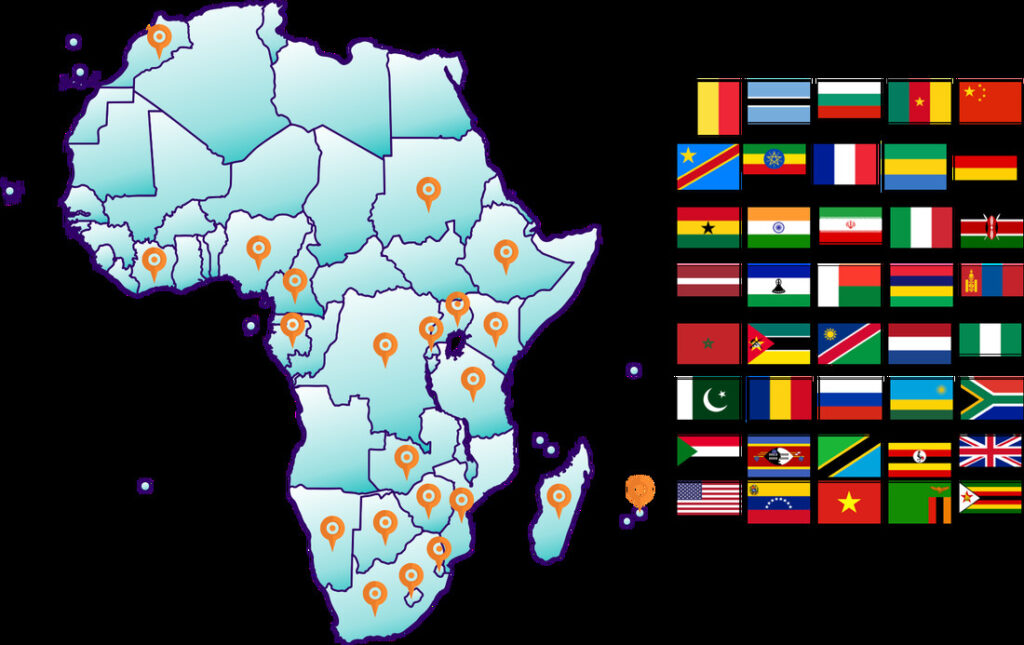
Deep Learning Indaba 2017 Resources:
Deep Learning Hackathon
We had some really exciting MIIA events this year (see also this post), but the Deep Learning Hackathon in September at the Digital Innovation Zone (The DIZ) in Johannesburg was one of the highlights for sure! The hackathon followed the Deep Learning Indaba and fitted in with the Deep Learning theme for the week. We had fantastic participation by all involved – participants, organizers, sponsors, and judges. A special thanks to Alex Conway and Chris Currin for their brilliant work not only to prepare the computer vision challenge (from a deep learning and data preparation perspective), but also their participation and support right through the day. We had a record breaking result, lots of learning and lots of fun. Thanks also to IBM and Cortex Logic for sponsoring both MIIA events on 15 and 16 September.
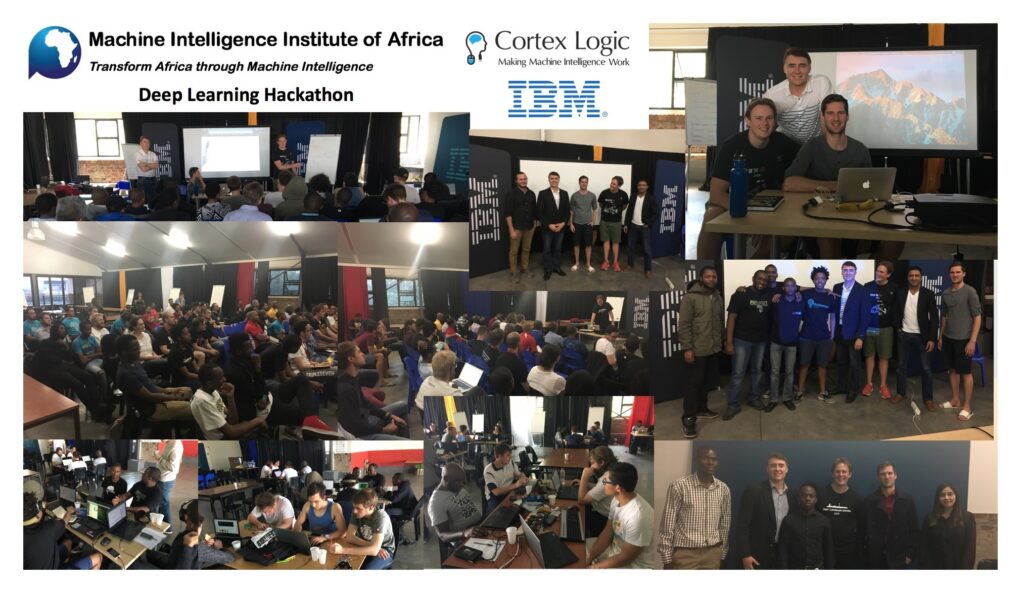
The challenge for the Deep Learning Hackathon was a computer vision related problem where the task was to identify potholes in images. The first image below provides a summary of the problem and why it is important within the South African transport and road safety context. The second image provide some details about the hackathon challenge itself. See more details about the full day event here.
- 9am-5pm: Working on Challenge
- 5-6pm: Working on Presentations
- 7-7:15pm: MIIA, Introductions to Panel of Judges and Sponsors
- 7:15-8:15pm: Team/participant presentations
- 8:15-8:30pm: Presentation of Prizes
Computer Vision Challenge: Pothole identification
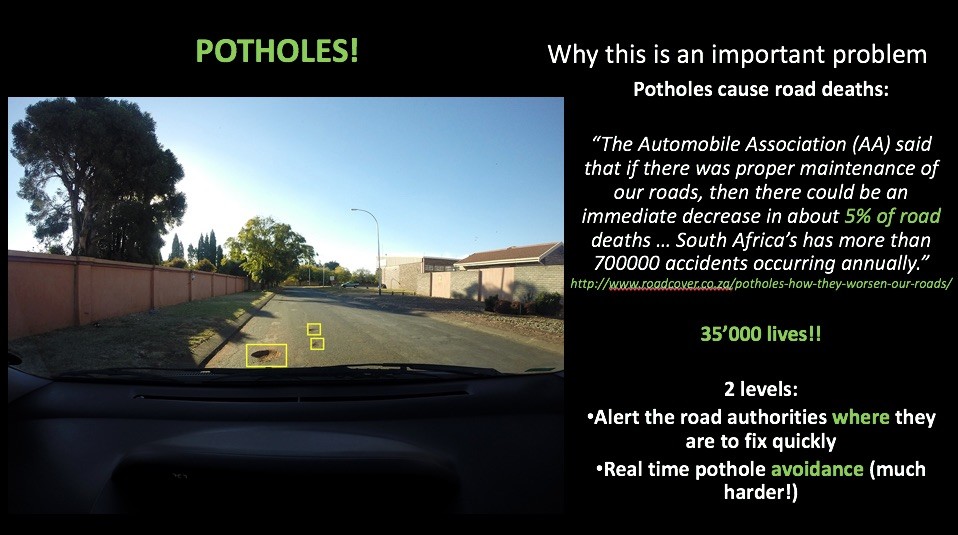

The hackathon problem was based upon the paper entitled ‘Detecting potholes using simple image processing techniques and real-world footage’, authored by S. Nienaber, M.J. Booysen and R.S. Kroon from Stellenbosch University (SU). In order to provide a reference for the Deep Learning participants, the published results from SU provided an excellent benchmark. As described in the summary below, SU was able to detect potholes with a precision of 81.8% and recall of 74.4.%.
Stellenbosch University Benchmark
DETECTING POTHOLES USING SIMPLE IMAGE PROCESSING TECHNIQUES AND REAL-WORLD FOOTAGE
Nienaber, S. ; Booysen, Marthinus J. ; Kroon, R. S.
34th Annual Southern African Transport Conference SATC 2015 – Theme – Transport: Working together to deliver – ‘SAKHA SONKE’, 6 to 9 July 2015, CSIR International Convention Centre, Pretoria, South Africa – http://scholar.sun.ac.za/handle/10019.1/97191
The original proceedings are available at http://repository.up.ac.za/handle/2263/5201
Potholes are a nuisance, especially in the developing world, and can often result in vehicle damage or physical harm to the vehicle occupants. Drivers can be warned to take evasive action if potholes are detected in real-time. Moreover, their location can be logged and shared to aid other drivers and road maintenance agencies. This paper proposes a vehicle-based computer vision approach to identify potholes using a window-mounted camera. Existing literature on pothole detection uses either theoretically constructed pothole models or footage taken from advantageous vantage points at low speed, rather than footage taken from within a vehicle at speed. A distinguishing feature of the work presented in this paper is that a thorough exercise was performed to create an image library of actual and representative potholes under different conditions, and results are obtained using a part of this library. A model of potholes is constructed using the image library, which is used in an algorithmic approach that combines a road colour model with simple image processing techniques such as a Canny filter and contour detection. Using this approach, it was possible to detect potholes with a precision of 81.8% and recall of 74.4.%.
Training & Test Data and Python Notebooks
https://drive.google.com/open?id=0B1IZ6xxwxyvTcWNOWHAxeVgyTlU
The photos below shows a number of the teams working on the problem throughout the day…
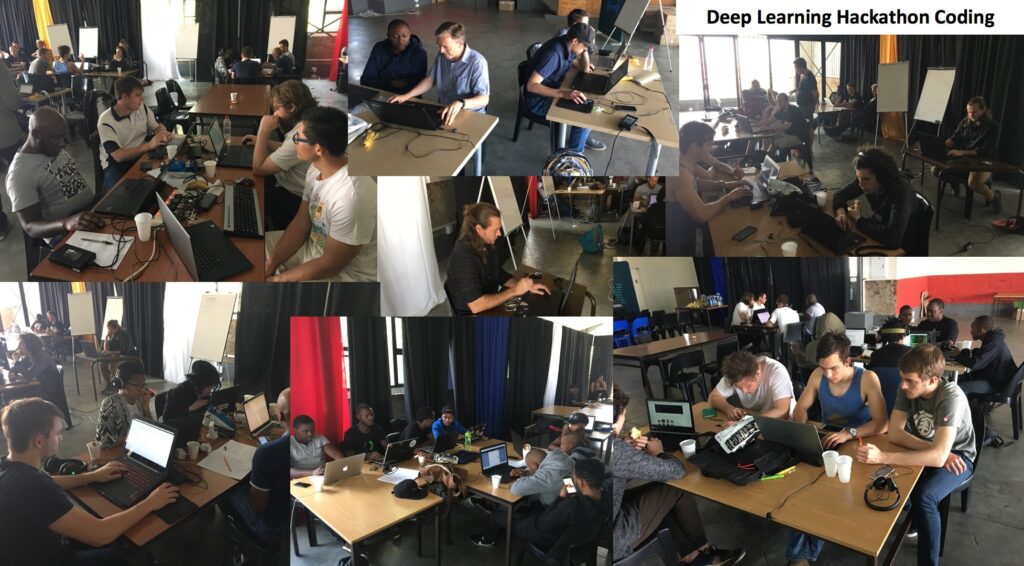
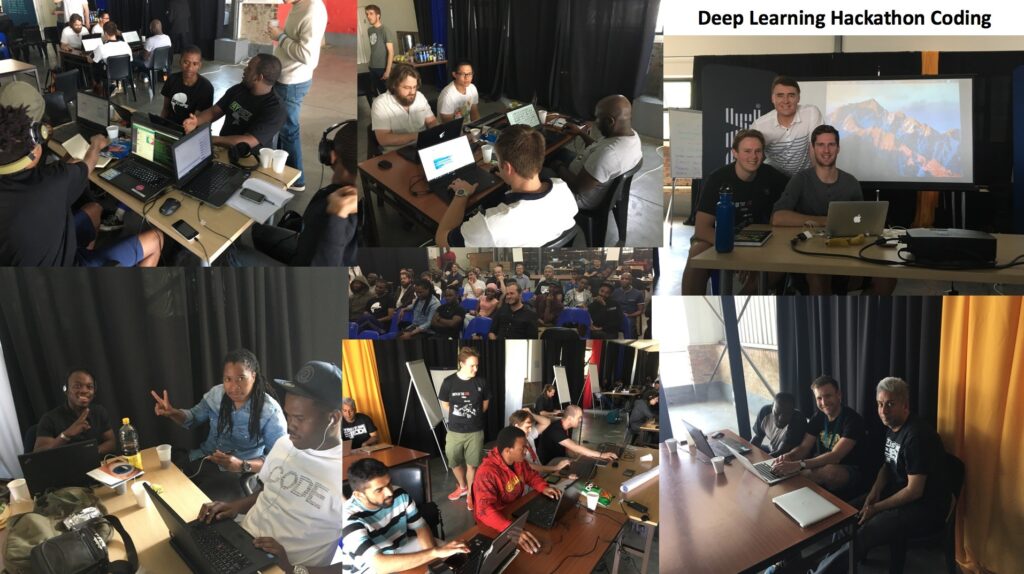
Deep Learning Hackathon Results
Model accuracy on Test Data (top 7 teams):
1. Jandre Marais – 85.58% –> First Prize (improved on the Stellenbosch University benchmark)
- Team: Jan Marais
- Presentation: https://drive.google.com/file/d/0BxzNs-HspAzYdDlUQzRDNjRGUlE/view?usp=sharing
- Winning solution: https://github.com/jandremarais/PotholeDetection
- News: Statistics student wins deep learning hackathon!
2. aiThenticate Team – 73.03% –> Second Prize
- Team: Charl van Deventer, Pieter Erasmus, Felix Kamdem, Shaun Chan Wing
- Presentation: https://drive.google.com/file/d/0BxzNs-HspAzYRl9sLVU1ZEVrbGc/view?usp=sharing
3. ThinkSmart Team – 73.00% –> Third Prize
- Team: Thulasizwe Mavuso, Mphiwe Ntuli, Emmanuel Mhlaba, Reuban Ramoswela, Goitsemang Sitsiba
- Presentation: https://drive.google.com/file/d/0BxzNs-HspAzYY0F6T3dJdTA5Tm8/view?usp=sharing
4. Urban Team – 70.97%
- Team: Alpha Hamadou Ibrahim, Simon Grest, Aslam Raffee
- Presentation: https://drive.google.com/file/d/0BxzNs-HspAzYQmM0TUwyWWxCSE0/view?usp=sharing
5. ThinkData Team – 61.00%
- Team: Khomotjo Modipa, Linda Mucassi , Njabulo Majozi, Lance Nyachoto
- Presentation: https://drive.google.com/file/d/0BxzNs-HspAzYbjRxNGE0MERmbVE/view?usp=sharing
6. HackOverflow Team – 58.06%
- Team: Phillip Jacobs, Phuti Matle, Alyson Ngonyama, Alex Coetzee, Phumie Nevhutala
- Presentation: https://drive.google.com/file/d/0BxzNs-HspAzYZ0QzZXJ6c0NHRlU/view?usp=sharing
7. Shallow Learning Team – 57.51%
- Team: Reino Harmse, Tinomuda Mahunyepa, Warren van Niekerk, William Yuill
- Presentation: https://drive.google.com/file/d/0BxzNs-HspAzYeEo2ZVJ5c0x2TUk/view?usp=sharing
- Model accuracy on test data (“after beer” :-)): 77.5%
Other:
- Pothole Detector TeamTeam: Neo Mthimkhulu, Sive Sandla, Lebogang, Carlos Ramoroka
- Presentation: https://drive.google.com/file/d/0BxzNs-HspAzYLWhONlkzUW1zaFU/view?usp=sharing
- Fast R-CNN TeamPresentation: https://prezi.com/bchshdp_amnp/faster-r-cnn/?utm_campaign=share&utm_medium=copy
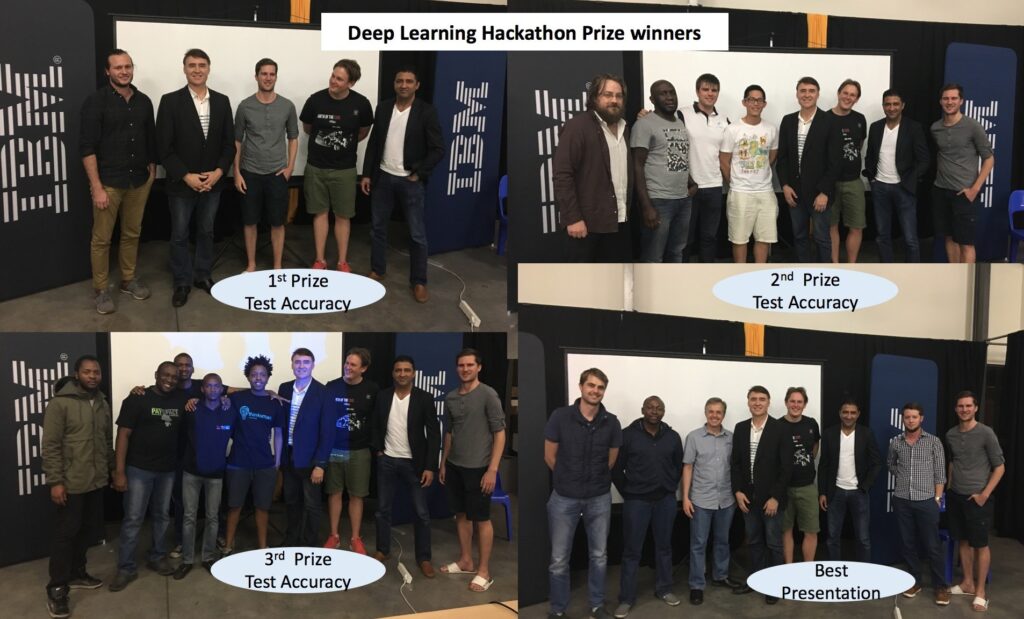
Best Presentation:
1. Shallow Learning Team
- Team: Reino Harmse, Tinomuda Mahunyepa, Warren van Niekerk, William Yuill
- Presentation: https://drive.google.com/file/d/0BxzNs-HspAzYeEo2ZVJ5c0x2TUk/view?usp=sharing
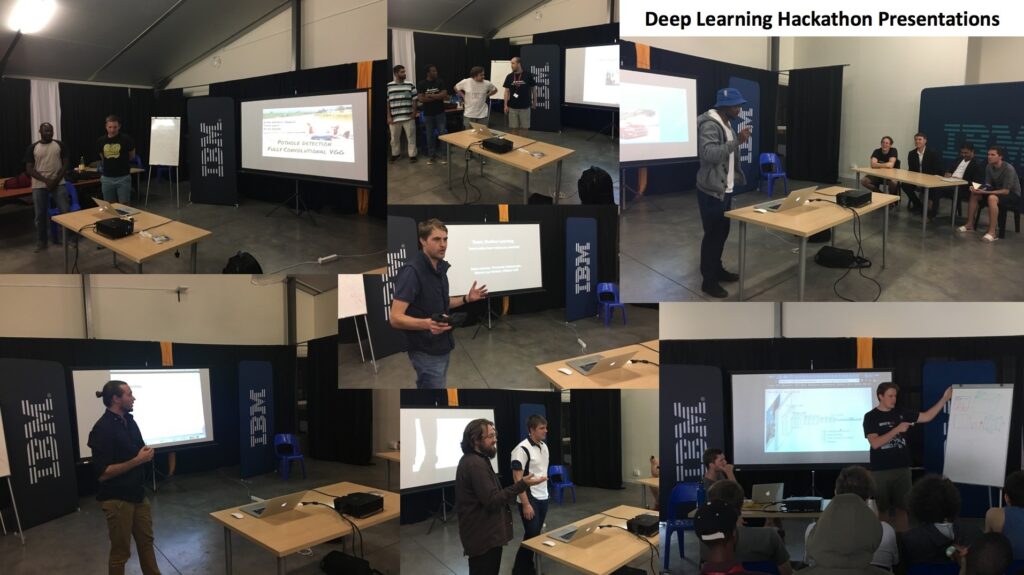
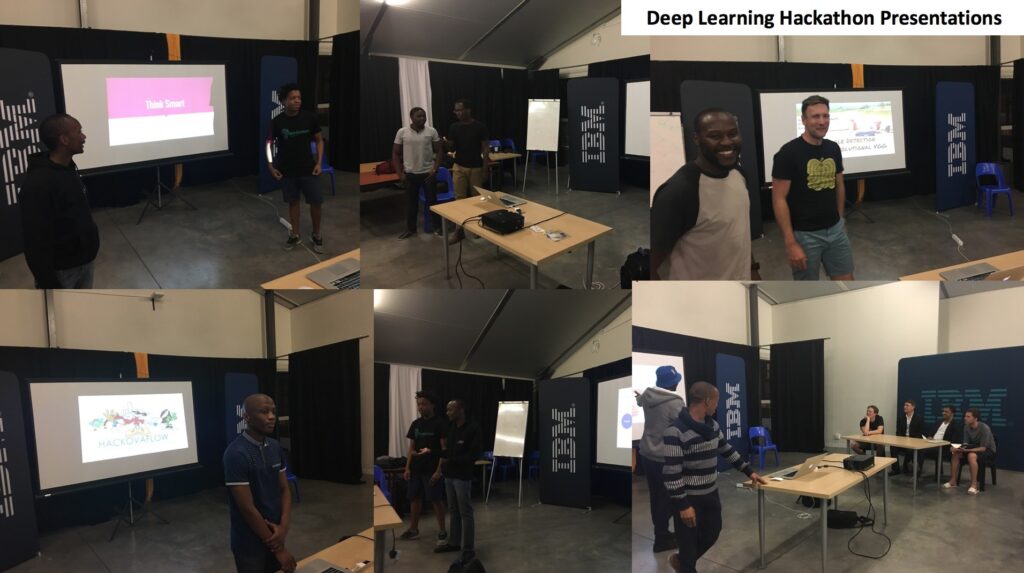
Deep Learning and its Applications
The MIIA event on the 15th of September not only served as a precursor to the Deep Learning Hackathon, but also some excellent presentations on some Deep Learning Applications. See links below for details.
MIIA Event on Friday, 15 September 2017 @ The DIZ, 111 Smit Street, Braamfontein, Johannesburg
Sponsors: IBM, Machine Intelligence Institute of Africa, Cortex Logic, eXe-ML, The DIZ
Agenda:
• “Introduction and MIIA update“, Dr Jacques Ludik, MIIA, Cortex Logic, Bennit.AI – presentation
• “Info session for Deep Learning Hackathon on 16 September“, Alex Conway, Founder & CTO, NumberBoost – see Computer Vision Challenge
• “Convolutional Neural Networks for Computer Vision Applications“, Alex Conway, Founder & CTO, NumberBoost – presentation
• “Conversational Systems: Beyond the Interface”, Chris Currin, PhD Computational Neuroscience candidate at UCT – presentation
• “Deep Learning and its Applications”, Dr Jacques Ludik, MIIA, Cortex Logic, Bennit.AI – presentation
Meetup: https://www.meetup.com/Machine-Intelligence-Institute-of-Africa-Jhb-Pta/events/242325146/
MIIA Events page: http://machineintelligenceafrica.org/activities/events/
Inaugural AI Africa Conference
MIIA will be represented at the inaugural AI Africa Conference on 26 and 27 October 2017 at Sandton Convention Centre, Johannesburg, where Dr Jacques Ludik will be delivering a keynote address on “AI in Africa – Past, Present & Future” as well as a presentation on “Operationalizing of AI and Big Data & Analytics to help businesses thrive in the Smart Technology Era“. The event is aimed at bringing together, under one roof, all stakeholders in AI on the African continent for the purposes of networking, enhancing knowledge and sharing new ideas and emerging trends. More details about this event will be made available soon.
See the following web page or Artificial Intelligence in Africa for details.
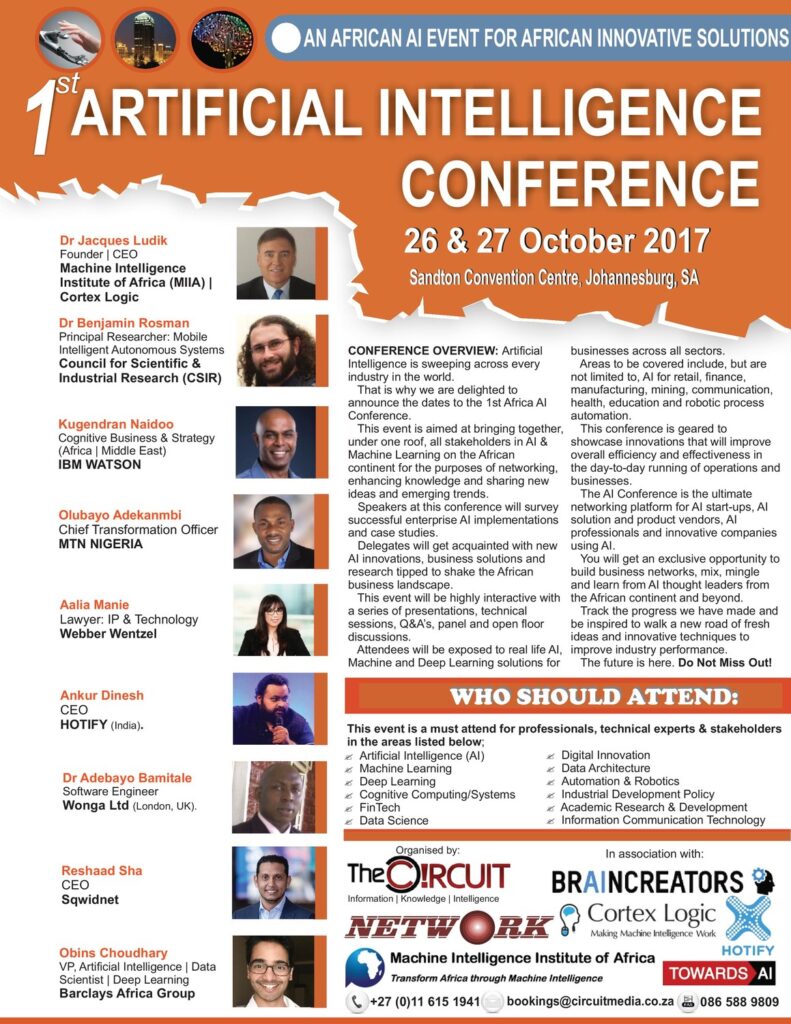
AI on Africa – Past, Present & Future (part 1) – Dr Jacques Ludik (President / CEO, MIIA, Cortex Logic, Bennit.AI)
- Presentation and Video
AI & the Law: Opportunities & Challenges – Aalia Manie (IP & Tech Lawyer, Webber Wentzel)
- Presentation and Video
AI on Africa – Past, Present & Future (part 2) – Dr Jacques Ludik (President / CEO, MIIA, Cortex Logic, Bennit.AI)
- Presentation and Video
AI: Decision Making in an Uncertain World – Dr Benjamin Rosman (Principle Researcher, CSIR)
- Presentation and Video
2017 Update : Global Tends in AI: Are we at the same pace as the rest of the world? – Reshaad Sha (CEO, Sqwidnet)
- Presentation and Video
Intelligent Assistants & Bots for Business and Industry – Kugendran Naidoo (Cognitive Business & Strategy, IBM Watson – Africa/Asia)
- Presentation and Video
Real-life Machine Intelligence Solutions for Industry – Tommaso Gritti (AI Solutions Leader, Brain Creators)
- Presentation and Video
AI Journey in Financial Services – Obins Cloudhary (VP AI, Barclays)
- Presentation and Video
Native Intelligence vs AI: winning the African BOP with AI – Olubayo Adekanmbi (CTO, MTN Nigeria) – Presented by Dr Jacques Ludik
- Presentation and Video
AI in Healthcare – Dr Raban Masuka (UCT)
- Presentation and Video
Bennit.AI – Intelligent Virtual Assistant for Manufacturing – Dr Jacques Ludik
- Bennit.AI – presentation
- Bennit.AI – video presentation
- Bennit.AI – demo (Sep 2017)
- Bennit.AI – demo (Oct 2017)
AI Systems Development and Use in Africa – Dr Adebayo Bamitale (Software Engineer, Wonga Ltd)
- Presentation and Video
Surveying AI in Africa – Tatenda Kavu (Computer Science Lecturer, Chinhoyi University, Zimbabwe)
Stock Market Predictions for Sub Sharan African Countries – Dennis Murekachiro (Bindura University of Science Education, Wits Business School)
Download the Conference Brochure: AI Africa Conference Brochure
Download the Registration Form: AI Africa Conference Registration Form
In the News: The “1st AI Africa Conference”
Accelerate Cape Town Thought Leaders Breakfast: AI and Machine Learning on 3 November 2017, Cape Town, South Africa
Dr Jacques Ludik has participated as a Though Leader on AI and Machine Learning at the Accelerate Cape Town Though Leaders Breakfast on 3 November 2017 from 7:30-10am.
- Impact of AI as exponential technology within the Smart Technology Era
- Applications of AI in a corporate context and in Africa
- Africa – some of the key challenges & opportunities
- Building AI and smart technology skills and capacity in Africa
- AI in Africa -The Future
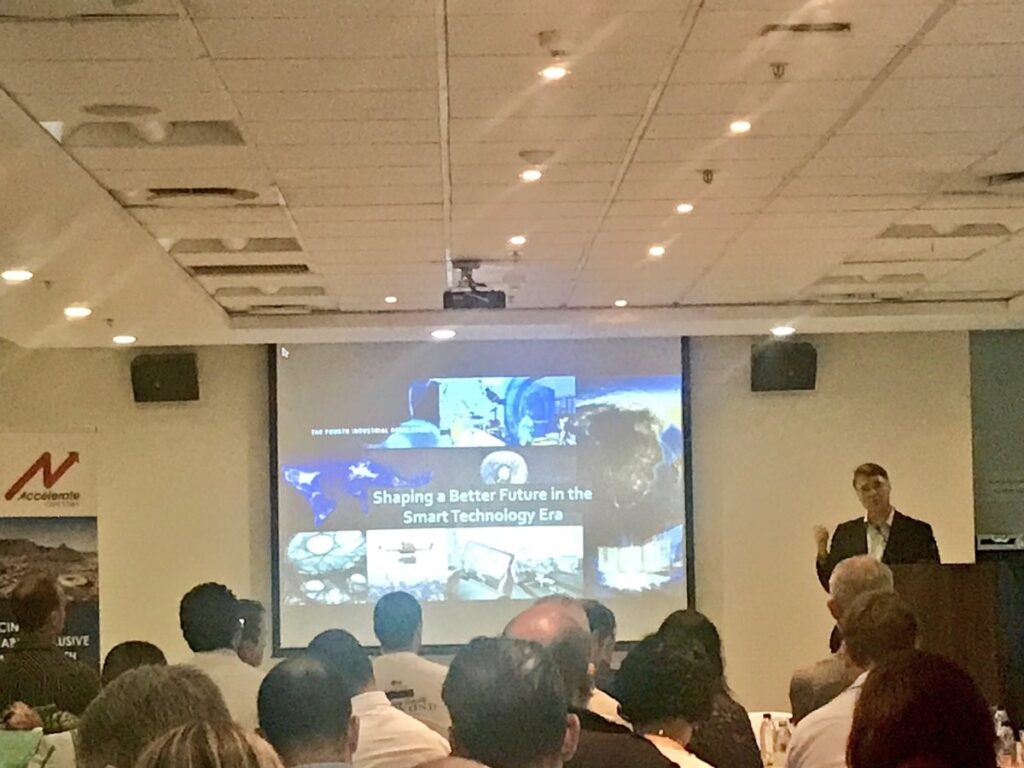
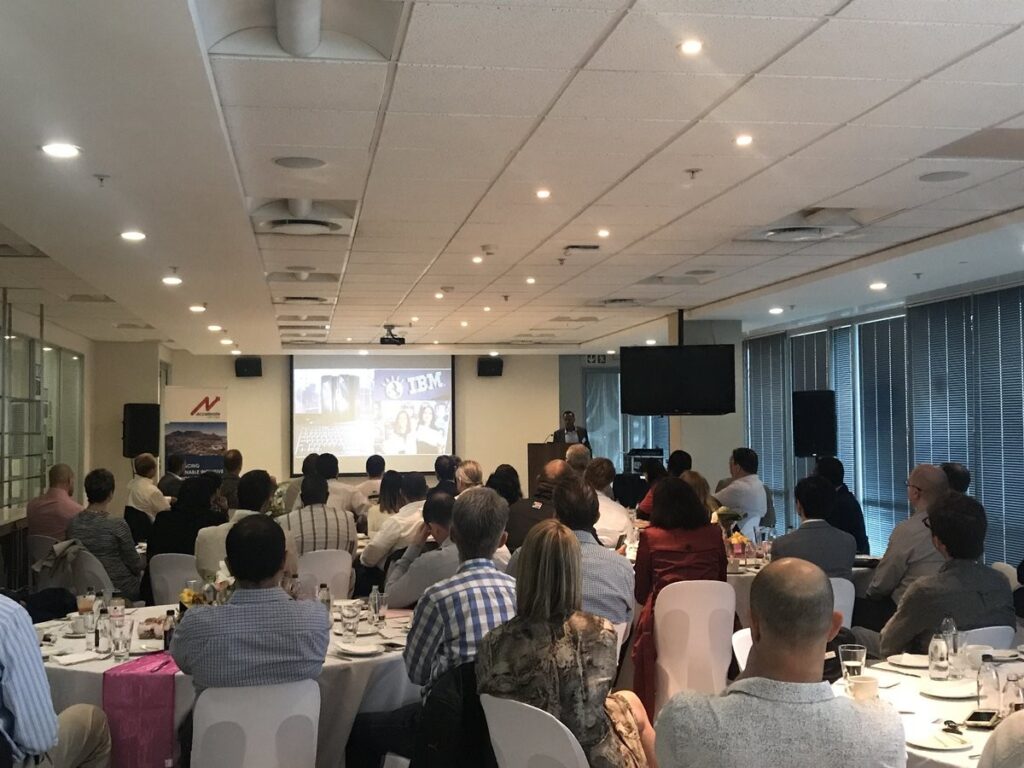
On the Dot / Media24 event: Leadership and Artificial Intelligence, 2 November 2017, Johannesburg, South Africa
Dr Jacques Ludik has partipated as a guest speaker on AI and Machine Learning at the On the Dot / Media24 event on 2 November 2017.

- Smart Technology Era
- Brief version of my AI story in Africa – the past, the present & the future
- AI as exponential technology in the Smart Technology Era
- Africa – some of the key challenges & opportunities
- AI in Africa -The past
- AI in Africa -The present
- AI in Africa -The future
Making the invisible visible: Digital footprints and financial inclusion on 1 November 2017 at Barclays Think Rise, Cape Town, South Africa
Making the invisible visible: Digital footprints and financial inclusion
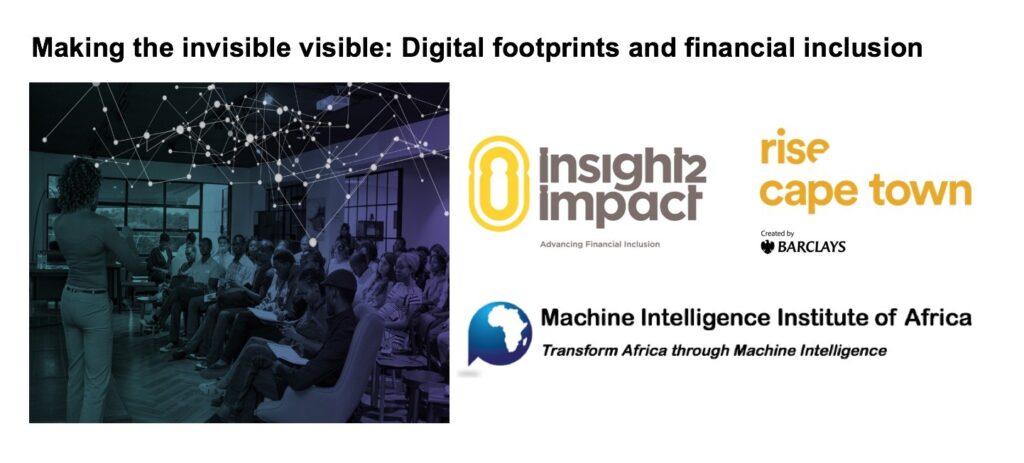
Interested in the space where financial services innovation meets data science? We know where you need to be on 1 November!
i2i, Rise Africa and MIIA are hosting a meetup on the theme “Making the invisible visible: Digital footprints and financial inclusion”.
What can I expect? Lightning talks on stimulating ideas followed by networking with like-minded solution seekers, snack-in-hand. The hosts will be joined by top teams from i2i data innovation competition DataHack4FI. For inspiration, read about what Branch is doing in Tanzania.
When? 1 November 2017, 17h30 – 19h00
Where? Rise Africa, 5th floor, Woodstock Exchange, Albert Road, Woodstock
RSVP at http://qkt.io/P7vRVF. Space limited.
Data Science Nigeria – 1st National Big Data Economy Summit & 2nd Data Science Bootcamp
Earlier this year MIIA has partnered with Data Science Nigeria and participated in their first Data Science Bootcamp (see Machine Intelligence Institute of Africa collaboration with Data Science Nigeria). In follow-up to this, Data Science Nigeria is having two major upcoming events during 12-15 October 2017, its 1st National Big Data Economy Summit & 2nd Data Science Bootcamp in Lagos, Nigeria. See below for more details about both events. MIIA has also provided an introductory video to the Data Science Nigeria’s 1st National Big Data Economy Summit & 2nd Data Science Bootcamp.
The 1st National Summit on Big Data Economy will bring together industry leaders, business executives, academia and cross-industry data science practitioners to discuss a Nigerian-centric Big Data agenda, especially as it relates to the practical application of data science in driving socio-economic development in emerging markets. Sessions will include practical showcase of data science application in the economy, consumer behaviour, health, business, city planning, security, agriculture, manufacturing and logistics. Dr Yemi Kale, the Statistician General of the Federation will be the keynote speaker as the No 1 data champion in the country.
The 2nd Data Science bootcamp will run side-by-side between Thursday, 12 October and Sunday, 15 October 2017. The bootcamp will include face-to-face teaching, virtual online classes, and a hands-on hackathon using the Kaggle platform on latest tools in Machine learning and advanced Statistics for Data science. The sessions will be facilitated by leading Nigerian data scientists and many international PhD-level data scientists, including both industry professionals and academics.
We do believe that these two events collaboration will reinforce the increasing importance of data in our national development and further position Data Science Nigeria as a transformational lighthouse and an enabler of the emerging knowledge-based economy.
Data Science Nigeria Bootcamp Sponsorship

Roundtable on AI and Inclusion, CAIR & World Wide Web Foundation, 6 November 2017 in Cape Town, South Africa
CAIR and the World Wide Web Foundation are having an interactive round table on the current landscape of Artificial Intelligence (AI) in South Africa. Dr Jacques Ludik will be representing MIIA at this event.
The event will be held on Monday, 6 November from 2:00-5:00 pm at the World Wide Web Foundation in Cape Town Address: Inyathelo, 2nd Floor, The Armoury, Buchanan Square, 160 Sir Lowry Road, Woodstock, 7925.
The discussion aims to present a balanced, cross-sector assessment of the state of AI in South Africa and the policy environment needed to support it.
While the changes from AI will unlock enormous economic, political and social benefits, there have not been significant policy discussions in South Africa about how best to leverage AI for the benefit of all South Africans – and to minimise any risks and negative effects.
The round table discussion will focus on this gap and potential remedies to close it.
Global Symposium on AI and Inclusion

MIIA (via Dr Jacques Ludik’s participation) will also be represented at the Global Symposium on AI and Inclusion on 8–10 November 2017, in Rio de Janeiro, Brazil. The Global Network of Internet and Society Research Centers (NoC) has organized the event which are co-hosted, on behalf of the NoC, by the Institute for Technology and Society of Rio de Janeiro and the Berkman Klein Center for Internet & Society at Harvard University, with support from the Ethics and Governance of Artificial Intelligence Fund. The aim of the Symposium is to deepen participants’s understanding of Artificial Intelligence inclusion challenges and opportunities, to identify and discuss areas for research, education, or action, and inform and incubate new projects and other collaborative efforts among participants. It will focus on identifying, exploring, and addressing the opportunities and challenges of Artificial intelligence. AI-related topics and issues will be explored from the perspectives of different actors, and by looking at a set of thematic core areas, such as social justice, health and wellbeing, education, data and infrastructure, law and governance, and employment and workplace.
Participants will include representatives from advocacy, philanthropy, media, policy, and industry, who will address both the opportunities and challenges of AI-based technologies through the lens of inclusion.
For more information, visit the following pages:
Machine Intelligence Institute of Africa (MIIA)
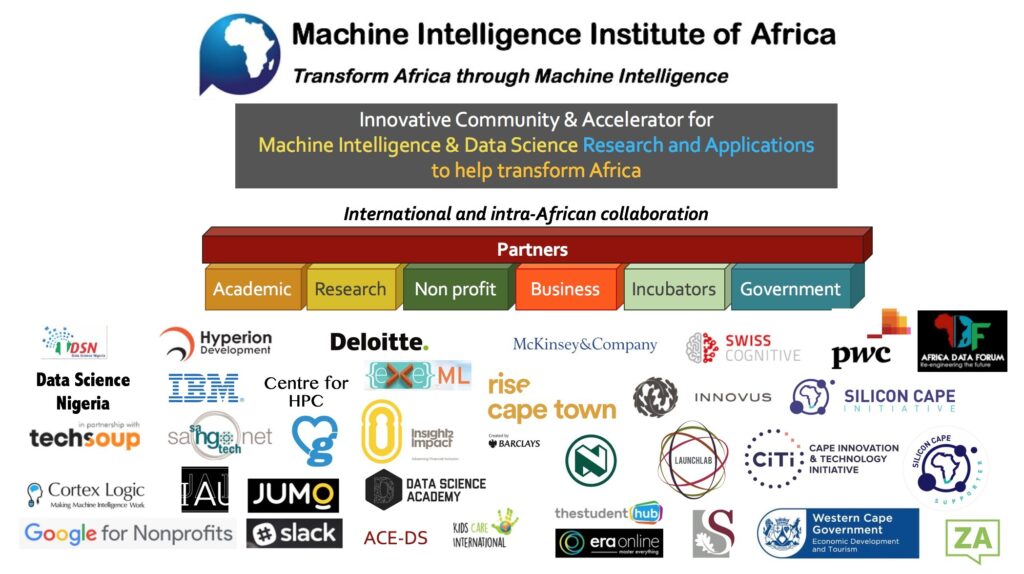
For some upcoming MIIA events, see the events page on the MIIA website.
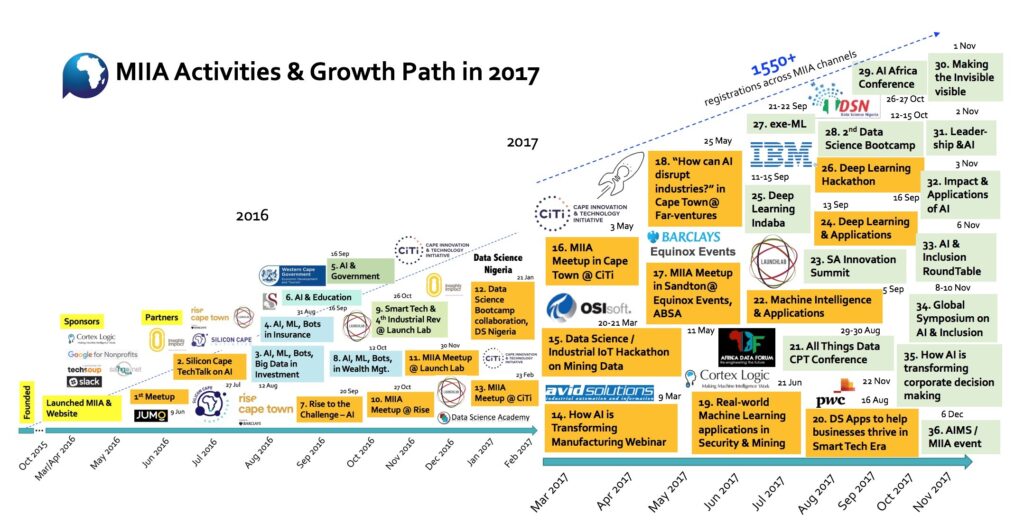
Machine intelligence Institute of Africa (MIIA):
- http://machineintelligenceafrica.org
- Community: http://machineintelligenceafrica.org/members/
- Events: http://machineintelligenceafrica.org/activities/events/
- Projects: http://machineintelligenceafrica.org/activities/projects/
- Partners: http://machineintelligenceafrica.org/partners/
- Blog: http://machineintelligenceafrica.org/blog/
- MIIA YouTube Channel (Playlist): http://www.youtube.com/playlist?list=PLOqigXLyHjNYf8R4WIM7HMVbQpQ03QNu-
Some Recent MIIA posts:
- Artificial Intelligence in Africa
- How Artificial Intelligence disrupts Industries
- Deep Learning applications, platforms, limitations and quantum computing
- AI in Manufacturing and Data Science/IoT hackathon on Mining data
- Data Science and Machine Intelligence use cases in Africa 2017
- Machine Intelligence Institute of Africa collaboration with Data Science Nigeria
- Solving Intelligence, Solving Real-world Problems
- Artificial Intelligence and Data Science use cases in Africa
- Machine Intelligence Institute of Africa
- Artificial Intelligence in Finance, Education, Healthcare, Manufacturing, Agriculture, and Government
- Artificial Intelligence at the centre of MIIA partner activities with Silicon Cape, Rise Africa, and Insights2Impact
Joining Machine Intelligence Institute of Africa (MIIA)
- Anyone interested to join MIIA and/or participate in using smart technologies to help address African problems such as those in education, finance, healthcare, energy, agriculture and unemployment is welcome to do this here. See How to participate for more details on various ways to help MIIA execute its mission.
- View the current MIIA Community on the MIIA website as well as MIIA communications on Slack, the LinkedIn group, Meetup, Google+, FaceBook, and Twitter.
- MIIA Meetup in Cape Town: https://www.meetup.com/Machine-Intelligence-Institute-of-Africa/
- MIIA Meetup in Johannesburg/Pretoria: https://www.meetup.com/Machine-Intelligence-Institute-of-Africa-Jhb-Pta/
Cortex Logic

- http://cortexlogic.com/
- Cortex Logic is a machine intelligence software and solutions company that provides an AI Engine for Platform Businesses and Corporates that solves well-defined and operationally relevant problems through operationalizing Data Science and Big Data & Analytics and delivering smart machine intelligence-based applications, solutions and products. Cortex Logic solves core business problems in a practical, cost-effective way using all available structured and/or unstructured data and smart technology. The solutions are typically implemented in an end-to-end, full stack, integrated, scalable, and secure manner. Where required, Cortex Logic operationalize Big Data & Analytics and Data Science by following CRISP-DM and ASUM-DM standards and implementing automated analytics within champion-challenger approach, which we typically maintain and keep up-to-date during the deployment and operational phase. Some of the state-of-the-art machine intelligence based applications, solutions and products include intelligent virtual assistants & advisors, fraud detection, churn prediction, smart risk scoring, smart trading, real-time customer insights, smart recommendations and purchase prediction, smart payment, medical risk prediction, precision medicine, and personalized AI search tools. It also aims to contribute towards solving intelligence through advancing the state-of-the-art in machine intelligence and building cognitive systems that are contextually aware, learn at scale, support unsupervised learning where possible, reason with purpose and interact with humans naturally.
Bennit.AI

- http://bennit.ai/
- Bennit.AI is a self-learning, highly personalized virtual production assistant specifically designed for industry, making the time and efficiency of industrial users its most important mission, every minute of every day. Bennit A.I. layers across existing technologies to drastically simplify and improve access to information, helping industrial users make better decisions and improve business outcomes.
